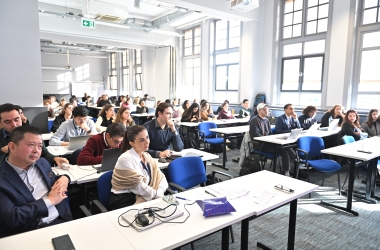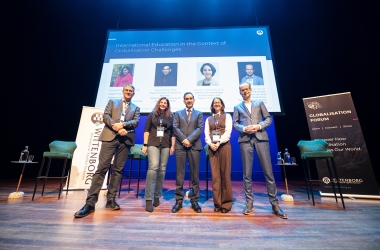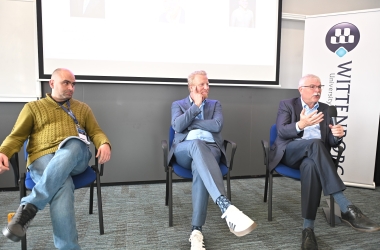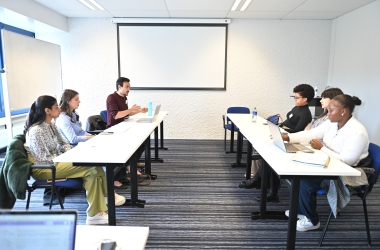Wittenborg’s Globalisation Forum Promotes Relevant Debates and Knowledge Exchange

Event Gathers Over 300 Participants Including Students, Researchers and Professionals
Bringing together students, researchers and professionals to explore the impact of globalisation across disciplines, the second edition of Wittenborg’s Globalisation Forum took place from 3 to 6 November in Apeldoorn. The event’s programme featured thematic reviews, conceptual papers and innovative approaches to teaching and learning, as well as plenty of activities for students.
With over 300 people attending, the forum opened at Apeldoorn’s prestigious Orpheus Theatre on 3 November with a keynote speech by Wittenborg’s president, Peter Birdsall, on ‘Education as the Nexus’. Following the opening, senior lecturer Marjon van Opijnen delivered the session ‘Environmental Challenges: Think Small, Act Big’.
This was followed by a panel discussion on ‘International Education in the Context of Globalisation Challenges’, which featured Tamara Mechurchlishvili, Head of the International Relations Office at the Georgian American University, and Laura Rumbley, Director of Knowledge Development and Research at the European Association for International Education (EAIE). The session also included Wittenborg Head of School of Business Rauf Abdul and Stephen Orme, Head of Business Development and Operations at Wittenborg.
According to Rumbley, the discussion on issues of equity and fairness as well as the positive and negative aspects of globalisation is really exciting and timely. “On top of that, it’s a really excellent example of co-creation where we’re in dialogue with students about a phenomenon that they’re directly involved in. The interaction of international experiences, voices and perspectives is so important to the quality of education, for the purpose of higher quality of experience and learning, which benefits everybody involved,” she said.

The day continued with presentations from the Erasmus Plus projects Green4ADU, delivered by Cha-Hsuan Liu, and BusyBees, presented by Vanessa de Oliveira Menezes, and concluded with debate training for bachelor’s and master’s students led by Tim Birdsall.
On 4 November, the activities moved to the Spoorstraat Campus. The day began with a keynote speech by Roeland van der Rijst. He serves as Editor of the International Journal for Academic Development and Pedagogische Studiën and is an Editorial Board Member of Teaching in Higher Education and Future in Educational Research.
Van der Rijst also joined a panel discussion on ‘Publishing in an Academic Journal’ alongside Wittenborg Rector Ronald Tuninga, Senior Associate Editor of the Journal of Global Marketing, and assistant professor Carlos Miguel Roos, Executive Editor of Empedocles: European Journal for the Philosophy of Communication.
Roos pointed out that taking part in the panel was useful to compare the ways in which editorship works across different disciplines. “By its very nature, the field of business studies is multidisciplinary, which is why approaches ranging from the humanities to the social sciences were represented in our discussion. I took home a good impression of how academic output is assessed in branches of academia other than mine. Interestingly, I found more similarities than differences in our respective approaches.”

He added that the students’ questions were genuine matters of concern. “It’s a good idea to take these concerns seriously, to pay attention. It’s usually up the younger generations to spot the cracks in the prevalent world pictures and professional practices.”
After a networking lunch, participants attended a Design Research Methodology workshop led by Wittenborg professor Ad Kil, followed by a research presentation for the Erasmus Plus COVE project ‘TourXperience’. Parallel paper presentations by Patience Orukpe, Cha-Hsuan Liu, Jian Liu and Carlos Roos concluded the academic programme, with closing drinks rounding off the day.
Student debates
The second edition of the Globalisation Forum was tied with this block’s project week. On 5 and 6 November, bachelor’s and master’s students were grouped in teams and participated in lively debate competitions. The results will be announced in the next few days.
Wittenborg Quality and Compliance Coordinator Florian Oosterberg was responsible for moderating the debates. She said that she really enjoyed the opportunity to engage with the academic side of the institution in a way she hadn’t before as a member of the support staff. “It offered a fresh perspective on how our lecturers work, interact with students and provide feedback, insights that I found personally enriching.”

Oosterberg added that it was inspiring to witness the passion and dedication each team brought to the table during the debates. “The level of preparation was clearly high, and the students demonstrated genuine engagement with the topics at hand. What stood out to me was the diversity in approach among the teams. Some relied heavily on data and evidence to support their arguments, though their delivery could have been more confident and persuasive. Others impressed with their presence and rhetorical skill yet would have benefited from stronger factual backing. Striking the right balance between these elements is a challenge, but also an opportunity for growth.”
According to her, the motions themselves were far from easy, yet both the proposition and opposition sides presented thoughtful and valid perspectives. “Most importantly, all teams maintained a respectful and professional tone throughout, contributing to a constructive and enjoyable debate environment.”
Jasmine Shaw, a South African student pursuing a BBA in Marketing & Communications, highlighted that she really enjoyed attending the keynotes, panels and presentations as well as participating in the debates. “I had never taken part in a debate before and found it to be something I really enjoy. Backing up arguments using evidence felt like a constructive and useful skill one could use in practically any context. It’s incredibly useful for students to learn how to disagree and challenge one another in a professional and direct manner,” she said.

Munich activities
Wittenborg’s Munich study location, the New European College (NEC), also held a Project Week connected to the Globalisation Forum, with students participating in a debating event on topics like globalisation, open borders, immigration and sustainability.
NEC’s director, Sascha Liebhardt, said that the activity wasn’t just an academic exercise, but also a training ground for real-world thinking. “Students tackled complex topics with curiosity, courage and care. And that, to me, is exactly what education should do: prepare you not just to know the world, but to engage with it,” Liebhardt emphasised.
Next editions
Wittenborg Research Centre manager Aydan Holtrigter, one of the event’s main organisers, pointed out that the institution plans to host the Globalisation Forum on an annual basis. “It is a great platform to bring young and seasoned researchers and students together, to exchange great ideas and provide students with new opportunities to explore. The next editions will not only be open to our own faculty and students, but also to all our external partner universities. We believe that at this pace, over the next few years, this event can grow into a recognised regional platform for exchange in applied research. We are already looking forward to the next edition,” she concluded.
WUP 19/11/2025
by Ulisses Sawczuk
©WUAS Press